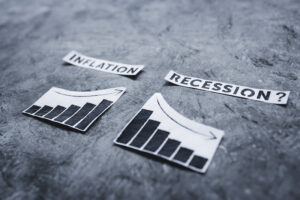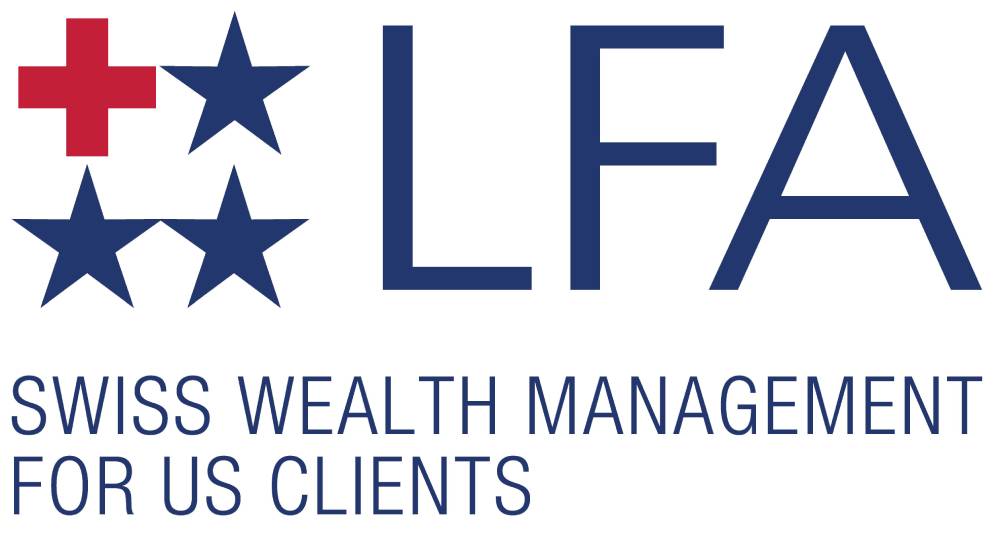
Inflation is at a 40-year high for the U.S. economy, and there is no end in sight. And, if we haven’t already, the rapidly rising costs due to high inflation has the potential to trigger a U.S. recession that could last for months or years.
The question is, how do you minimize the personal financial damage that is caused by these economic events?
Inflation and recession damage companies’ earnings, negatively impacting their valuations. The U.S. stock market entered Bear Market territory at the time of this writing. No one really knows how long this market cycle will last: we know it will end; we just cannot predict when.
Investors with substantial assets need a strategy that minimizes their losses and produces positive returns by staying focused on the best investments during rampant inflation and recession periods.
Our Swiss-based wealth management firm will share several tips on ways you can protect the value of your assets during these volatile times.
This quick guide will shed light on several critical financial topics about inflation, recession, and what you can do about it:
- How does inflation trigger a recession?
- Why are some countries better prepared for inflation than other countries?
- Will there be a recession in the United States?
- How can I protect my wealth from U.S. inflation and recession?
- Which assets maintain their value the best during recessions?
- Why is diversification such a critical strategy for reducing your overall risk?
- Is investing globally a better alternative than investing domestically?
- How to invest internationally?
How does inflation trigger a recession?
Inflation drives up the cost of doing business, which drives down the demand for goods and services due to higher prices. Falling demand reduces the revenues impacted by the sale of goods and services. This, in turn, triggers unemployment as companies reduce staff to balance their supply and demand equations.
How does the U.S. inflation rate impact the quality of your life?
Higher rates of inflation impact the purchasing power of your assets and income. Your dollars buy fewer goods and services, which affects the quality of your life and the lives of your loved ones.
Inflation also impacts the value of your savings. You will need to accumulate more assets to preserve your desired standard of living during periods of excess inflation.
In fact, this is the definition of a real rate of return. You determine your gross rate of return (10%) and deduct the annual rate of inflation (3%) to determine your real rate of return (7%).
Why deduct the rate of inflation from your gross return? The real return is a more accurate measurement of the purchasing power of your assets.
Is the U.S. dollar rising or falling in comparison to other major currencies?
The U.S. is not the only country impacted by inflation and recession. Some economists believe the U.S. will be affected less than some of the other industrialized countries. As of September 2022:
- The U.S. dollar has risen more than 14% against several of these countries.
- Emerging countries with higher dollar-denominated debt have been damaged the most.
Why are some countries better prepared for inflation than others?
Inflation rates can be substantially different on a country by country basis. This is based on various economic cycles that can vary by country. Countries also have different growth rates, average incomes, cost of living, housing, and dependency on imports.
Countries’ results will also vary based on their political stability. For example, the Green Movement in the U.S. is adding significantly to energy costs that impact commuting, heating/cooling, and production expenses.
Investing in Swiss francs and companies is one way to recession-proof your assets.

The Swiss franc has been called a safe haven currency
for many reasons. Switzerland is one of the wealthiest countries in the world, with a thriving economy, political stability, and a disciplined central bank. The Swiss benefits can create a stable environment for all or part of your assets.
Some currencies are less stable due to their debt levels in relation to their amounts of Gross Domestic Product. See the 12 countries with the highest levels of GDP debt ratios:
- Venezuela: 350%
- Japan: 266%
- Sudan: 259%
- Greece: 206%
- Lebanon: 172%
- Cabo Verde: 157%
- Italy: 156%
- Libya: 155%
- Portugal: 134%
- Singapore: 131%
- Bahrain: 128%
- United States: 128%
A few countries are major developed economies (Japan, U.S.). Most countries fall into the emerging market category with higher debt and lower GDPs.
There is a bottom line: Investing in a Swiss managed portfolio is one way to reduce the financial impact of difficult economic times! If you want to learn more, please contact our LFA team so we can answer your questions.
Why do most HNW individuals invest in the global securities markets?
It stands to reason investors with larger asset amounts diversify their assets using global investment strategies. They buy German cars, Swiss watches, Italian fashion, and American technology because they seek the best quality they can afford.
A popular choice for assets is Switzerland if you’re looking for a stable country to invest part of your net worth. You can diversify your assets into:
- Swiss global asset management
- Swiss francs
- Swiss banks
- A stable economy
Will there be a recession in the United States?
Many global economists believe the U.S. is already in a recession on this publication date. When you combine inflation with a recession, you have a phenomenon frequently seen as stagflation, which is more onerous than just inflation or recessions.
Notwithstanding the Covid recession that occurred for one month in 2020, The Great Recession in America occurred from 2007 to 2009 when the toxic mortgage pools imploded. From its peak in August 2008 to its low in March 2009, the S&P 500 decreased by 48%.
There were a few crucial differences between then and now:
- There have been record low-interest rates since 2007, which has helped fuel economic growth.
- U.S banks have strong balance sheets in 2022.
- Many Americans still have substantial savings.
- Interest rates are still relatively low compared to other inflationary periods.
- The U.S. has more than $30 trillion of government debt, which is snowballing.
- Americans have experienced more than ten years of growth and positive stock market returns before this Bear Market.
- Higher tax rates may be on the horizon.
How can I protect my wealth from U.S. inflation and recession?
One way to protect your wealth from some of the pain associated with U.S. inflation is to invest in global markets and currencies. For example, the Swiss franc is one of the most stable currencies in the world because of its fiscally stable government and low government debt.
A disciplined investment strategy can also protect your wealth from emotion-backed investment decisions that can cause you to make the wrong decisions at the wrong time. For example, you sell after the market has declined substantially, and you buy after the market has appreciated a considerable amount.
Discipline is better than emotion any time you are investing your assets.
At LFA, we can help you invest in the global securities markets.
Switzerland has a national bank that conducts monetary policy as an independent central bank. It acts in the best interests of the whole country versus any political party or business interest.
Perhaps you have read about the complete privacy policies of Swiss banks.
Which assets maintain their value the best during recessions?
Several asset classes can help you retain the market value of your assets during adverse market conditions. These could potentially build your wealth during adverse market conditions.
You should consider investments that are more stable than asset classes that are impacted by inflation and recessions: For example, income-producing real estate, precious metals, and TIPS (U.S. Treasury Inflation-Protected Securities).
Stocks are usually more volatile than bonds. In such conditions, value stocks tend to perform better than growth stocks due to their higher dividends.
Gold has historically provided investors with protection against inflation. Many HNW investors still view gold as one of the best ways to protect some of their wealth during market volatility and economic uncertainty.
Ask us to review your current investment portfolio to discuss additional diversification opportunities and the possible addition of alternative investments.
Why is diversification such an important strategy for reducing your overall risk?
Diversification is the key to minimizing your risk of large losses. This is the equivalent of placing your eggs in several baskets and watching the performance of each basket very carefully. You are spreading your investment risk over several asset classes, so no one investment’s decline in value hurts all of your investments.
An even better strategy is to invest in asset classes that do not increase or decrease in value simultaneously due to the same market conditions. A better mix would be assets that offset each other. For example, income-producing real estate is going up in value while common stocks are decreasing in value due to the same economic conditions.
Your wealth may be at risk even if you are unprepared for adverse market conditions.
Another way to manage risk is to determine when you need the assets or income from your investments. For example, when you send your children to college, buy the vacation home of your dreams, or retire and live the way you want to for the rest of your lives. This is your investment horizon.
The shorter your investment horizon, the lower your risk tolerance because you have less time to recover from bad markets. The longer your investment horizon, the higher your risk tolerance because you have more time to recover.
Is investing globally a better alternative than investing domestically?

- You want to invest in the world’s best companies, not one country.
- Global diversification reduces your overall investment risk.
- Investing in Swiss francs (in addition to the dollar) is a conservative option for protecting some of your wealth.
- The Swiss franc’s low inflation rate and interest rates make it a more attractive investment alternative than less stable currencies experiencing higher rates of inflation.
- Switzerland’s stable economy has been growing steadily since World War II. This makes investments in this country more secure during periods of volatile economic conditions (for example, the United States).
- You need expert advice when you invest globally. Ask us how to prepare for a recession and invest during periods of high inflation.
How to invest internationally?
There are several considerations when you decide to invest globally.
- Research currencies as well as stocks and bonds.
- Consider opening a Swiss bank account and call our team for advice!
- Explore stable investments in Switzerland.
- Make sure the politics of the countries are stable
- Review the tax policies of the countries you invest in
- Some of the best companies in the world are headquartered in Switzerland.
- Higher portfolio diversification is vital because it reduces your risk.
Next steps…
If you want to protect your assets from inflation, the volatility of the U.S. dollar, and the leering recession, then it’s time to consider investing globally with the team of Swiss experts at LFA. The benefits of global wealth management can improve your performance and reduce your risk.

